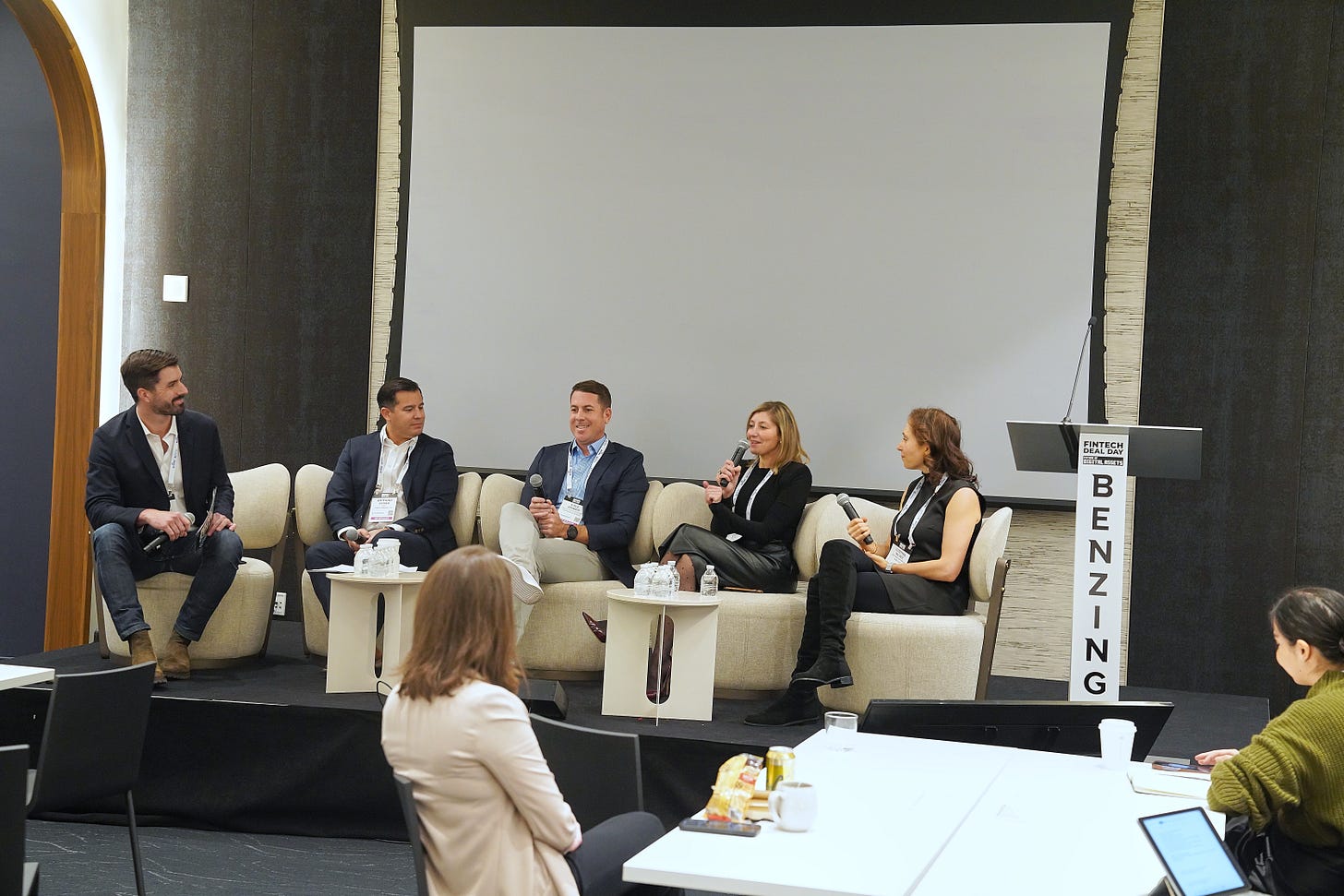The Season to be Thankful
🏆 Stakeholder Labs is named Runner-up for 'Best New Product' at the 2023 Benzinga Fintech Awards
Happy Thanksgiving! The Stakeholder Labs team wishes everyone a restful and enjoyable holiday with friends and family. The Roundtable Roundup is approaching its one-year anniversary and we can’t think of a better way to celebrate that milestone with runner-up recognition at the 2023 Benzinga Fintech Awards for ‘Best New Product’.
Last week’s event brought together leaders, institutions and startups from across the financial world for an action-packed day of conversations and networking. Special shoutout to our friends at Imagination for joining us at the event and sharing their notes and reactions included in this week’s Roundtable Roundup.
For Stakeholder Labs, last week was an opportunity to connect directly with important leaders in the world of individual investing including BlackRock, WeBull, Robinhood and MoneyLion to explore strategies for encouraging financial literacy and behavior change. Key Takeaways:
Learning by doing is shaping how people approach markets
The journey from transactional trading to long-term investing starts with education
Educated investors become more active, valuable users to brokerages
Anthony Denier - CEO - Webull - 5:25
So I think there's not one simple way to define retail investor because you have retail traders and then you have retail investors. And they're two completely distinct sort of ideologies in terms of when you talk about retail.
And I think we've (Webull) had a lot of success over the last several years with tapping in to that transactional, that retail trader looking for intraday momentum, trying to capture volatility. And as we've all evolved in terms of social media in terms of the changing dynamic of the market itself we started focusing a lot more and we talk about evolution and growth focusing from taking a transactional type investor and turning them into a long term investor - looking at the bigger picture…talking about goals and how to achieve those goals.
Stephanie Guild - Senior Director, Investor Strategy - Robinhood - 8:45
We have something called the Robinhood Investor Index, and that's where we look below the hood and across all of the investors that we have on our platform. And the long term investors…I don't see them being or behaving any differently…than you see a Warren Buffett, to be honest.
They invest in what they know and use. Like I would call Apple almost a utility company today, because you can't do anything without your phone. It pays a dividend too. But it's not me promoting Apple at all. It's not investment advice, but I'm just using examples that like, we see our customer base investing in what they know and use and what they think will grow for the long term.
Cynthia Kleinbaum Milner - CMO - MoneyLion - 12:00
I have to confess. I messed up when I joined MoneyLion and I thought, I'm gonna give them veggies. I'm gonna tell them this is how you reach financial freedom. And guess what? Nobody wants veggies…
They want gamification. You come from Reddit, right? Like we see that many of our products are discussed in Reddit forums…
We didn't drive virality. Customers drove virality and ready starting thing. Talking to each other. What did we do? We're bringing that community into our app. We saw that our products were being talked about in social media. What did we do? We brought that social media feed into our app.
Stephanie Guild - Senior Director, Investor Strategy - Robinhood - 16:07
We talk about vegetables too. We say “we'll put chocolate on them so that you get to them eventually.”
Anthony Denier - CEO - Webull - 20:13
There was a lot of things I think Cynthia touched upon that really made sense. She said gamification, by the way, first, before I said gamification so I just want my chief compliance officer who's in the crowd to know that. It's really, important and Steph mentioned too for, Robinhood, to incentivize customers to want to learn.
And you could talk about eating your vegetables or you could talk about every town in this country has probably in the center of their town, one of the nicest buildings is probably going to be your town municipal library, and it's always empty. Why is it empty? Just because you build it doesn't mean they're going to come.
Doesn't mean they're going to consume the information because it's available. You need to incentivize or even gamify. The consumption of that information, and there's a lot of different ways to do that learn and earn, I think, is a really good is a really good method to do that. We do a different method where it's similar, but we would award points for completing different modules of education, and they range anything from what is an equity to what is an iron condor, right?...You [need to] speak the same language as a demographic of customer that you have on your platform.
Kyle Braden - Director, Business Development - BlackRock - 24:36
We partner with platforms like MoneyLion, Robinhood and Webull to get our message across, and they've done a phenomenal job of building relationships with our customer base.
So our content, our education, our material will likely be delivered by our partners as well. We're excited to do that, but it's important that we get the word out there, not only through the platforms, but to Cynthia's point on financial influencers. We've also started a strategy this year to engage with financial influencers and to my comments on the life path ETFs earlier, we brought 40 influencers to the NYC this morning to extend that launch with us as I speak right now.
We're doing a workshop in our Hudson Yards location, educating them on what we're doing not only about product, but about proxy voting, how to get that message across to the end investors as well.
Cynthia Kleinbaum Milner - CMO - MoneyLion - 31:33
We actually have a metric that's not very common for a financial services company or a fintech, which is daily active usage. It's a type of KPI that normally like social media companies would report on because if a bank or a financial institution is saying our customer comes to us every day, it's usually because… their account is like almost at zero and they're very afraid of having overdraft fees…
In our case, we're measuring daily active usage in terms of consumption of content because we know that when people come and they consume content, they're then going to take an action.
The action doesn't have to be opening an account every time you come. If you come every day, there's not going to be an account being open every day, but it will result in cross purchases and in increased lifetime value. So the lagging indicator that we're looking to move is obviously customer lifetime value.
…How much time do you spend? How many pieces of content did you consume? The conversion rate of those pieces of content and referral. For us, a big piece of our acquisition engine is still having our customers refer in moments of joy.
We know that a customer refers when they're really proud of the app that they're using or the product they want to show off, and they're super excited about their friends also using it. So referral is another metric that we track on a daily basis.
Anthony Denier - CEO - Webull - 34:01
How to quantify our education, our customer experience, and our overall kind of customer happiness, if lack of a better word. We can do a lot of predictive work on just what they do within the first few seconds of opening an account. For example, if a customer opens a Weil account and the first play, they, the first place they go after the successful opening of an account is to the promotions page.
I can tell you pretty spot on that one third of those customers will never come back again. It's a lost customer. They opened an account simply to get something free. They got their free share of stock, it wasn't a share of Google, it's only $10 worth, which is 98 percent of everyone, and they walk away.
Then, there's the customer that opens an account, and the first place they go is to the deposit page, right? To actually fund their brokerage account. Now I can tell you that 80 percent of the time, that customer is also going to trade.
And then probably my most favorite is when a customer opens an account, the first place they go to is the learning center. That's the longest term customer that we have. That's the customer engaging in equities trading, options trading, and looking at all the tools and looking around the app, engaging in the community, posting in the community, commenting and giving feedback. That's the most valuable customer. So it just goes to show, education is not just us trying to do something positive for the investor.
It's something positive for our business and our bottom line at the same time. If we can get a customer to open an account and then interact with the learning content, that makes for an overall better customer, it makes their experience better, and it's more profitable.
Decoding Global Fintech Investment
Kevin O’Leary, O’Leary Ventures; Anthony Pompliano, Pomp Investments

The cryptocurrency landscape is undergoing significant changes, with a shift away from dominant players like FTX and Binance, increased SEC regulation, and investor skepticism towards crypto brokers involved in litigation.
Market interest is predominantly concentrated on Bitcoin and Ethereum, with little serious investment in other cryptocurrencies, while alternative asset classes like collectibles are gaining traction.
Economic and policy factors, including higher-than-reported inflation, the Federal Reserve's indifference towards small businesses, and the impact of presidential policies on the economy, are driving market decisions.
Emerging trends and observations include the potential overvaluation of AI technology stocks, innovative investment opportunities in unconventional areas, and a growing preference for hard assets like residential real estate and compliance-focused crypto exchanges.
Trends, Innovation, and Disruption in Investment Management
Stephen Sikes, Public; Katherine Park, Andra Capital
Investment management firms are focusing on creating customer-centric content and launching AI-enhanced products, catering to a diverse equity investor base across gender and socioeconomic lines.
The industry is seeing a shift towards multi-asset securities, including equities, ETFs, crypto, and fixed income, with a simplified approach to portfolio theory and an emphasis on zero commissions and fractional shares.
Post-pandemic trends indicate a move towards more conservative investing, with increased customer interest in fixed income securities, particularly government and municipal bonds, due to their safety and tax advantages.
Challenges in the investment management sector include addressing user interface for customer education, navigating the complexities of bringing alternative products to retail investors, and adapting to the long-term impact of non-zero interest rates on retail investing.
Improving Market Accessibility
Steve Quirk, Robinhood; Brendan Wood, SnapTrade
The introduction of non-custodial trade APIs marks a significant advancement in trading technology, although specific applications are yet to be detailed.
A thorough understanding of the equity market is essential to comprehend the retail investor market, benefiting from the unprecedented availability of data and information.
Modern brokerage accounts are characterized by negligible or no account minimums and significantly reduced technology costs for providers.
Robinhood's evolution reflects a journey alongside its customer base, transitioning from a niche offering to a broader service scope, with many customers being first-time brokerage account holders now considering retirement and advisory services.
The investment landscape shows a trend of shorter holding periods for retail investors compared to the overall market, and for platforms like Robinhood, international expansion has become a key focus area.
Building Data Products for an Evolving Investment Landscape
Bill Dague, Nasdaq; Jake Greenstein, Hivemind
Building data products for investment involves combining proprietary market data with alternative sources, focusing on treating all internal data as a commercial asset through aggregation, normalization, and quality assurance.
Key attributes for data products include reliability, accuracy, timeliness, relevance, and uniqueness, with the development lifecycle from research to launch often spanning several years.
The pandemic has spurred the demand for specific operating data like airline capacity and retail activity, highlighting the necessity for continuous market engagement to tailor data products to client needs and making data more actionable.
The integration of AI and machine learning is critical in data products, enhancing data quality and interpretation, with an emphasis on understanding and leveraging the strengths and limitations of these technologies in data processing and analysis.
The Changing Dynamics of Traditional Advisory with Robo Advisors
Connor Coughlin, Apex FinTech; Schlomo Lang, CohnReznick
Robo advisors, while growing in popularity, are not expected to completely replace human financial advisors, who offer value beyond stock picking, particularly in product selection and tax advice.
There's an emerging need for new models that blend the strengths of both financial and robo advisors to provide more comprehensive advice.
The traditional fee structure of financial advisors, often around 1% annually, is being scrutinized, especially when it translates to limited hours of advice.
Contrary to expectations, robo advisors are finding more appeal among mature investors over 40, likely due to their more complex financial needs, while traditional firms like Schwab have achieved success by expanding beyond their initial discount brokerage models.
Empowering Self-Directed Financial Services
Lule Demmissie, eToro; Rishi Karma, Stocktwits; Steve Sanders, Interactive Brokers; Abdul Zoheb, UpLeg; Barry Bernstein, ViewTrade
Despite recent market challenges, there hasn't been a significant exodus of retail investors like during the 2008 financial crisis, and investing remains a key method for wealth accumulation.
Modern investment platforms are keeping users engaged through app-based interfaces, zero commission models, and the fostering of online communities, although overall activity levels have dipped.
Fractional investing and keen observation of both active and passive investor behaviors on platforms offer insights into evolving market trends and investor preferences.
The user experience, especially among younger investors who prioritize technology and community over traditional institutions, is critical, with international investors showing a strong home bias except in the tech sector, highlighting the need for tailored approaches in global markets.
Conclusion
We, at Stakeholder Labs, are deeply thankful not just for the warmth of family and friends, but also for the journey we've embarked on over the last year in the world of fintech. Last week's event was a collection of new ideas and discussions where the empowerment of the individual investor was at the forefront, driven by innovative platforms and a shift towards more inclusive financial literacy and engagement strategies. Our heartfelt thanks to our friends at Benzinga for hosting our team and acknowledging our contributions to the industry as Runner-up for ‘Best New Product’. We hope you all have a great holiday weekend!








